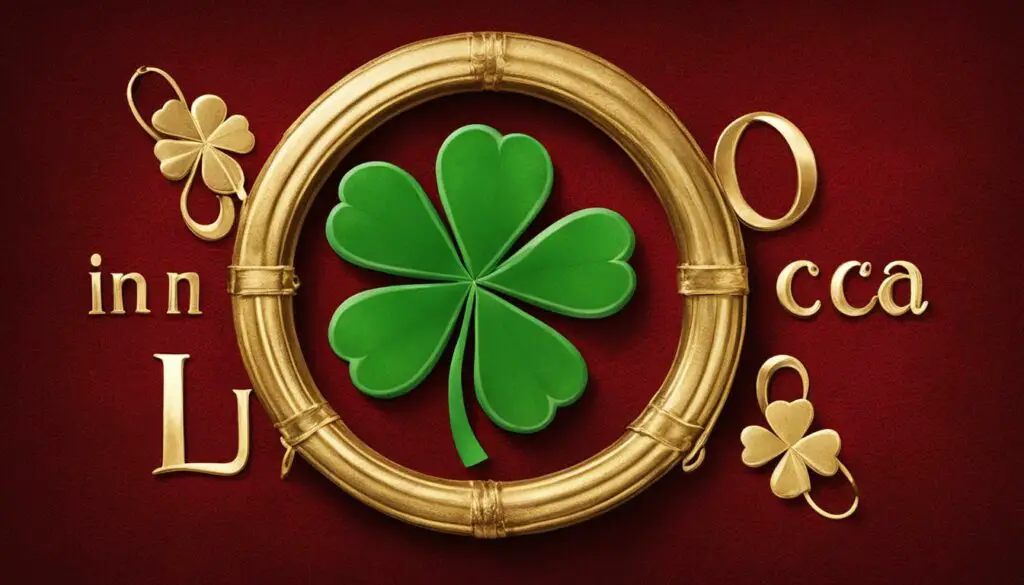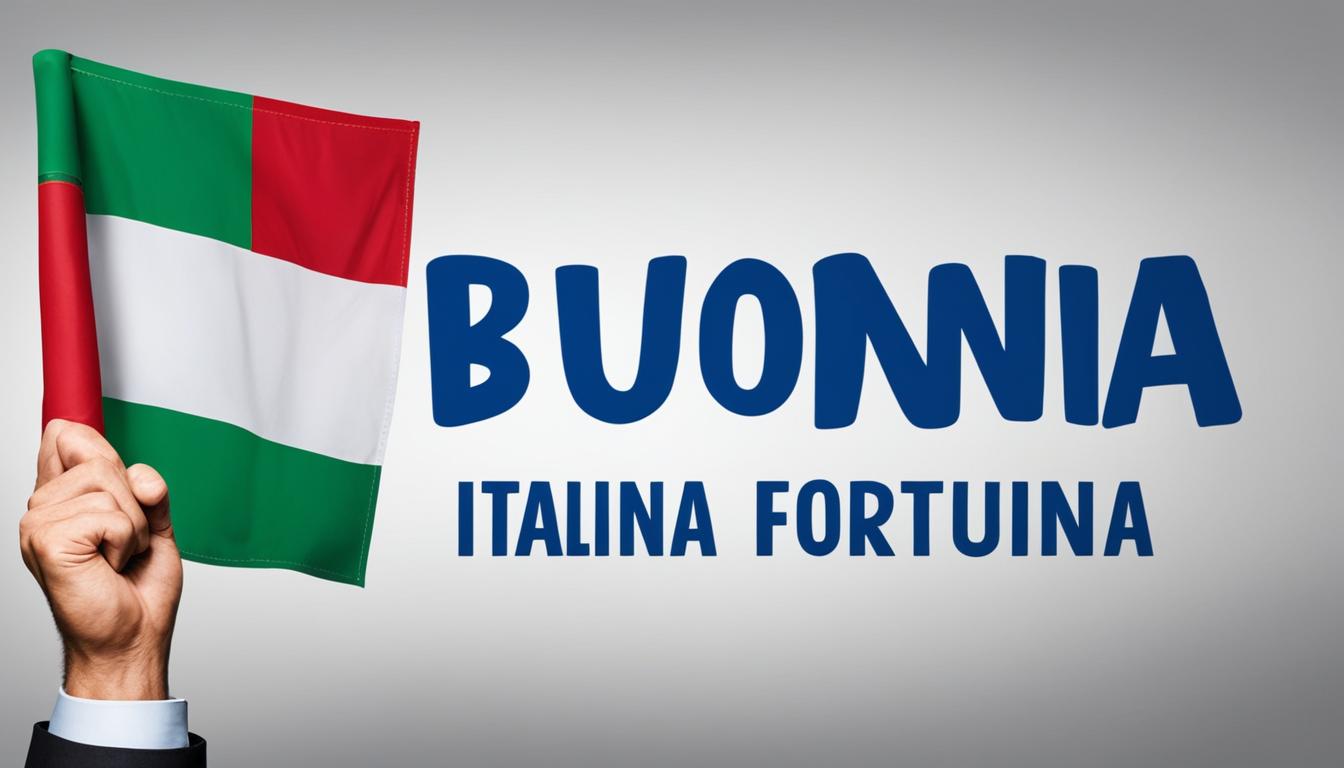Originally posted on January 1, 2024 @ 5:25 am
Knowing how to say good luck in Italian can be useful when interacting with Italians or traveling in Italy. Superstitions are common throughout Italy, and there are various phrases and cultural references related to luck. In this article, we will explore different ways to wish someone good luck in Italian and provide translations and pronunciations for each phrase.
Key Takeaways:
- Learn different ways to express good luck in Italian
- Discover the unique phrase “In bocca al lupo” and its origins
- Explore common phrases for wishing good luck in Italian
- Understand Italian cultural references to luck
- Master the pronunciation of Italian good luck phrases
Saying Good Luck in Italian – Literal Translation

When it comes to expressing good luck in Italian, a simple and common phrase is “Buona fortuna”. In this phrase, “buona” means “good” and “fortuna” means “luck.” So literally, it translates to “good luck.”
This straightforward translation is a versatile way to convey well wishes to someone in Italian. Whether they have an exam, a job interview, or any other important event, saying “Buona fortuna” is a kind gesture that is sure to be appreciated.
Here is how it’s written:
Buona fortuna
In Bocca al Lupo – A Unique Phrase for Good Luck

Another way to wish someone good luck in Italian is by saying “In bocca al lupo,” which translates to “Into the wolf’s mouth.” This phrase has a unique origin and is often used among Italians. It is believed to ward off bad luck and is similar to the English phrase “Break a leg.” When someone says “In bocca al lupo,” the standard response is “Crepi il lupo,” meaning “May the wolf die.”
Italy is known for its rich culture and traditions, and language plays an important role in everyday interactions. The expression “In bocca al lupo” is commonly used in various situations to wish someone good luck. It is especially popular in the world of theater and performing arts, where performers often say it to each other before going on stage.
The origin of this phrase is debated, but it is believed to have its roots in ancient superstitions. According to one theory, it originated from the belief that mentioning good luck directly would actually bring bad luck. By using the phrase “In bocca al lupo,” people were able to indirectly express their well wishes without invoking any negative energy.
“In bocca al lupo,” meaning ‘In the wolf’s mouth,’ is a curious Italian way of wishing someone good luck. It’s like saying ‘I hope you succeed in your endeavor’ without explicitly saying it.”
This unique phrase is deeply ingrained in Italian culture and often used by Italians to encourage and support each other. Whether it’s before an exam, a job interview, or any other important event, “In bocca al lupo” is a way to share positive energy and reinforce a sense of camaraderie.
So, the next time you want to wish someone good luck in an Italian way, remember to say “In bocca al lupo.” It’s a phrase that not only carries well wishes but also reflects the cultural richness and superstitions of Italy.
Now, let’s explore other common phrases for wishing good luck in Italian in the following section.
Common Phrases for Wishing Good Luck in Italian

In addition to the commonly used phrases “Buona fortuna” and “In bocca al lupo,” there are other Italian expressions you can use to wish someone good luck. These phrases are versatile and can be used in various situations to convey well wishes and encouragement.
Auguri
Translation: Best wishes
The phrase “Auguri” is a simple and heartfelt way to wish someone good luck. It can be used in a wide range of contexts, such as birthdays, weddings, or any other occasion where good wishes are appropriate.
Ti auguro buona fortuna
Translation: I wish you good luck
If you want to express your specific well wishes to someone, you can say “Ti auguro buona fortuna.” This phrase carries a personal touch and shows that you genuinely care about their success.
Using these phrases allows you to connect with Italians on a deeper level, as they appreciate when others take an interest in their language and culture. By wishing someone good luck in Italian, you can create a positive and friendly atmosphere.
| Italian Phrase | English Translation |
|---|---|
| Auguri | Best wishes |
| Ti auguro buona fortuna | I wish you good luck |
Italian Cultural References to Luck

Italy is known for its rich cultural heritage and diverse traditions. When it comes to luck, Italians have their fair share of beliefs and symbols. Here are some of the cultural references to luck in Italian culture:
1. Italian Horn (Il Corno Portafortuna)
The Italian horn, also known as “il corno portafortuna,” is a popular good luck symbol in Italy. It is often worn as a pendant or charm to ward off the evil eye and bring good fortune. The horn is believed to protect against negative energies and bring prosperity to the wearer.
2. Ladybugs (La Coccinella)
In Italy, ladybugs are considered a symbol of luck and happiness. It is believed that when a ladybug lands on you, it brings good fortune. Italians often associate ladybugs with positive outcomes and see them as a sign of good luck.
3. Number 13
Contrary to popular superstitions in other cultures, the number 13 is considered lucky in Italy. Italians believe that the number 13 brings good fortune and positive experiences. It is not uncommon to see Italians using the number 13 as a lucky charm or incorporating it in their daily lives.
4. Number 17
On the other hand, the number 17 is associated with bad luck in Italy. This belief dates back to ancient times, when the Roman numeral XVII, which represents 17, is an anagram for “VIXI” meaning “I have lived” or “I am dead.” As a result, many Italians consider the number 17 unlucky and try to avoid it whenever possible.
5. Horseshoe (Il Ferro di Cavallo)
The horseshoe, known as “il ferro di cavallo” in Italian, is a common symbol of good luck. Italians often hang horseshoes above their doorways to invite good fortune into their homes. It is believed that the horseshoe acts as a protective barrier, preventing bad luck from entering.
6. Eating Lentils (Le Lenticchie) on New Year’s Eve
Another Italian tradition associated with luck is eating lentils, known as “le lenticchie,” on New Year’s Eve. It is believed that eating lentils brings prosperity and financial success in the coming year. Italians often enjoy dishes like lentil soup or lentils with cotechino, a traditional Italian sausage, to celebrate the New Year and attract good luck.
| Italian Good Luck Symbols | Description |
|---|---|
| Italian Horn (Il Corno Portafortuna) | A symbol worn as a pendant or charm to ward off the evil eye and bring good fortune. |
| Ladybugs (La Coccinella) | A symbol associated with luck and happiness, believed to bring positive outcomes. |
| Number 13 | Considered lucky in Italian culture, representing good fortune and positive experiences. |
| Number 17 | Associated with bad luck in Italy, often avoided due to its ancient symbolism. |
| Horseshoe (Il Ferro di Cavallo) | A symbol hung above doorways to invite good fortune and protect against bad luck. |
| Eating Lentils (Le Lenticchie) on New Year’s Eve | A tradition believed to bring prosperity and financial success in the coming year. |
These Italian cultural references and symbols add color and meaning to the concept of luck in Italy. Whether it’s wearing an Italian horn for protection or indulging in lentils on New Year’s Eve, these traditions and beliefs continue to play an important role in Italian culture.
Origins of the Phrase “In Bocca al Lupo”

The exact origins of the phrase “In bocca al lupo” are unknown. There are theories that relate it to ancient Roman myths and legends, as well as stories from Italy’s history. One theory suggests a connection to the story of Romulus and Remus, the founders of Rome, who were raised by a she-wolf. Another theory links it to hunters going on expeditions. Regardless of its origins, “In bocca al lupo” has become a widely used phrase to wish someone good luck in Italian.
How to Pronounce Italian Good Luck Phrases
Pronouncing Italian phrases for good luck correctly is essential for effective communication. Paying attention to the pronunciation of each word ensures clear communication and allows you to convey your well wishes accurately.
Here are two common Italian phrases for good luck and their pronunciations:
- Buona fortuna – Pronounced as bwon-a four-too-na
- In bocca al lupo – Pronounced as een bok-kah al loo-poe
By mastering the pronunciation of these phrases, you can confidently express your good luck wishes in Italian and connect with Italians on a deeper level. Remember, practice makes perfect!
Using Italian Words of Comfort and Encouragement

In addition to wishing someone good luck, it’s often helpful to offer words of comfort and encouragement. The Italian language provides a range of phrases that can uplift and inspire someone in various situations.
Sei fantastico/a
The phrase “Sei fantastico/a” translates to “You are awesome” in English. This expression can be used to boost someone’s confidence and let them know that their abilities and qualities are admired.
Andrai alla grande
“Andrai alla grande” means “You are going to do great.” This phrase is a powerful way to encourage someone and express confidence in their future success.
Whether you want to motivate a friend, support a colleague, or uplift a loved one, these Italian words of comfort and encouragement can convey your heartfelt sentiments. Use them to inspire and empower those around you.
Italian Equivalent for “Best Wishes”

The Italian equivalent for “Best wishes” is Auguri. This versatile phrase is used in Italian culture to express well wishes for various occasions, such as birthdays and holidays. Whether you want to wish someone happiness, success, or good fortune, “Auguri” is a commonly used expression that conveys your heartfelt wishes. Add a touch of Italian charm to your greetings by using “Auguri” to wish your loved ones the best in their endeavors. May their dreams come true!
(Source: Second source)
Italian Phrases for Best Wishes
In addition to “Auguri,” there are other Italian phrases you can use to express your best wishes:
1. Buon Compleanno – Happy Birthday
2. Buon Natale – Merry Christmas
3. Buon Anno – Happy New Year
4. Buon Viaggio – Have a good trip
5. Buon Anniversario – Happy Anniversary
These phrases can be accompanied by additional words of encouragement or specific wishes tailored to the occasion. Embrace the warmth and positivity of Italian culture by using these phrases to spread joy and goodwill.
Italian Phrases for Best Wishes and Their Meanings
| Italian Phrase | English Translation |
|---|---|
| Buon Compleanno | Happy Birthday |
| Buon Natale | Merry Christmas |
| Buon Anno | Happy New Year |
| Buon Viaggio | Have a good trip |
| Buon Anniversario | Happy Anniversary |
Italian Superstitions and Good Luck Symbols
Italy is a country rich in superstitions and beliefs when it comes to luck. The Italians have various traditions and symbols that they associate with good fortune and warding off bad luck.
One interesting superstition in Italy is related to numbers. While the number 13 is considered lucky, the number 17 is seen as unlucky. This belief is deeply rooted in Italian culture and often influences people’s decisions and actions.
Italian culture also includes several symbols that are believed to bring good luck. One such symbol is the Italian horn, known as “il corno portafortuna.” This charm, often worn as jewelry, is believed to protect against the evil eye and bring good fortune to the wearer.
Another symbol of good luck in Italy is the ladybug, known as “la coccinella.” Ladybugs are considered auspicious and are believed to bring blessings and protection. It’s common to see images of ladybugs on various items like home decor, clothing, and accessories.
| Superstition/Belief | Italian Name | Meaning |
|---|---|---|
| Number 13 | Tredici | Lucky |
| Number 17 | Diciassette | Unlucky |
| Italian Horn | Il Corno Portafortuna | Brings good fortune and protects against the evil eye |
| Ladybug | La Coccinella | Brings blessings and protection |
These superstitions and symbols are deeply ingrained in Italian culture and are often passed down through generations. They reflect the Italians’ belief in the power of luck and their desire to invite positive energy into their lives.
Conclusion
Learning how to say good luck in Italian is not only useful for communication but also allows you to connect with Italian culture and traditions. Understanding the different phrases and symbols associated with luck in Italy can help you engage in meaningful conversations and make a positive impression on Italians.
By mastering phrases like “Buona fortuna” and “In bocca al lupo,” you can express well wishes and encouragement in various situations. Additionally, knowing how to pronounce these phrases correctly is essential for clear communication.
Don’t forget to explore Italian cultural references to luck, including symbols like the Italian horn and ladybugs. Familiarizing yourself with these symbols will deepen your understanding of Italian superstitions and beliefs.
Whether you’re traveling to Italy or simply interacting with Italians, use these phrases and symbols to convey your well wishes effectively and embrace the richness of Italian culture.
FAQ
How do you say good luck in Italian?
The phrase “Good luck” can be translated to Italian as “Buona fortuna.”
What is the literal translation for saying good luck in Italian?
The literal translation for saying good luck in Italian is “Buona fortuna.”
What does “In bocca al lupo” mean and how is it used?
“In bocca al lupo” translates to “Into the wolf’s mouth” and is a commonly used phrase to wish someone good luck in Italian.
What are some other ways to wish someone good luck in Italian?
Other phrases commonly used to wish someone good luck in Italian include “Auguri” (Best wishes) and “Ti auguro buona fortuna” (I wish you good luck).
Are there any cultural references or symbols associated with luck in Italy?
Yes, Italy has several cultural references and symbols associated with luck, such as the Italian horn (il corno portafortuna) and ladybugs (la coccinella).
What are the origins of the phrase “In bocca al lupo”?
The exact origins of the phrase “In bocca al lupo” are unknown, but there are theories connecting it to ancient Roman myths and legends.
How do you pronounce Italian phrases for good luck correctly?
For example, “Buona fortuna” is pronounced as “bwon-a four-too-na,” while “In bocca al lupo” is pronounced as “een bok-kah al loo-poe.”
What are some Italian words of comfort and encouragement?
Phrases like “Sei fantastico/a” (You are awesome) and “Andrai alla grande” (You are going to do great) can provide support and motivation.
What is the Italian equivalent for “Best wishes”?
The Italian equivalent for “Best wishes” is “Auguri,” which can be used for various occasions.
What are some Italian superstitions and good luck symbols?
In Italy, the number 13 is considered lucky, while the number 17 is seen as unlucky. Good luck symbols include the Italian horn (il corno portafortuna) and ladybugs (la coccinella).
Why is it important to learn how to say good luck in Italian?
Learning how to say good luck in Italian allows for effective communication and a deeper understanding of Italian culture and traditions.
